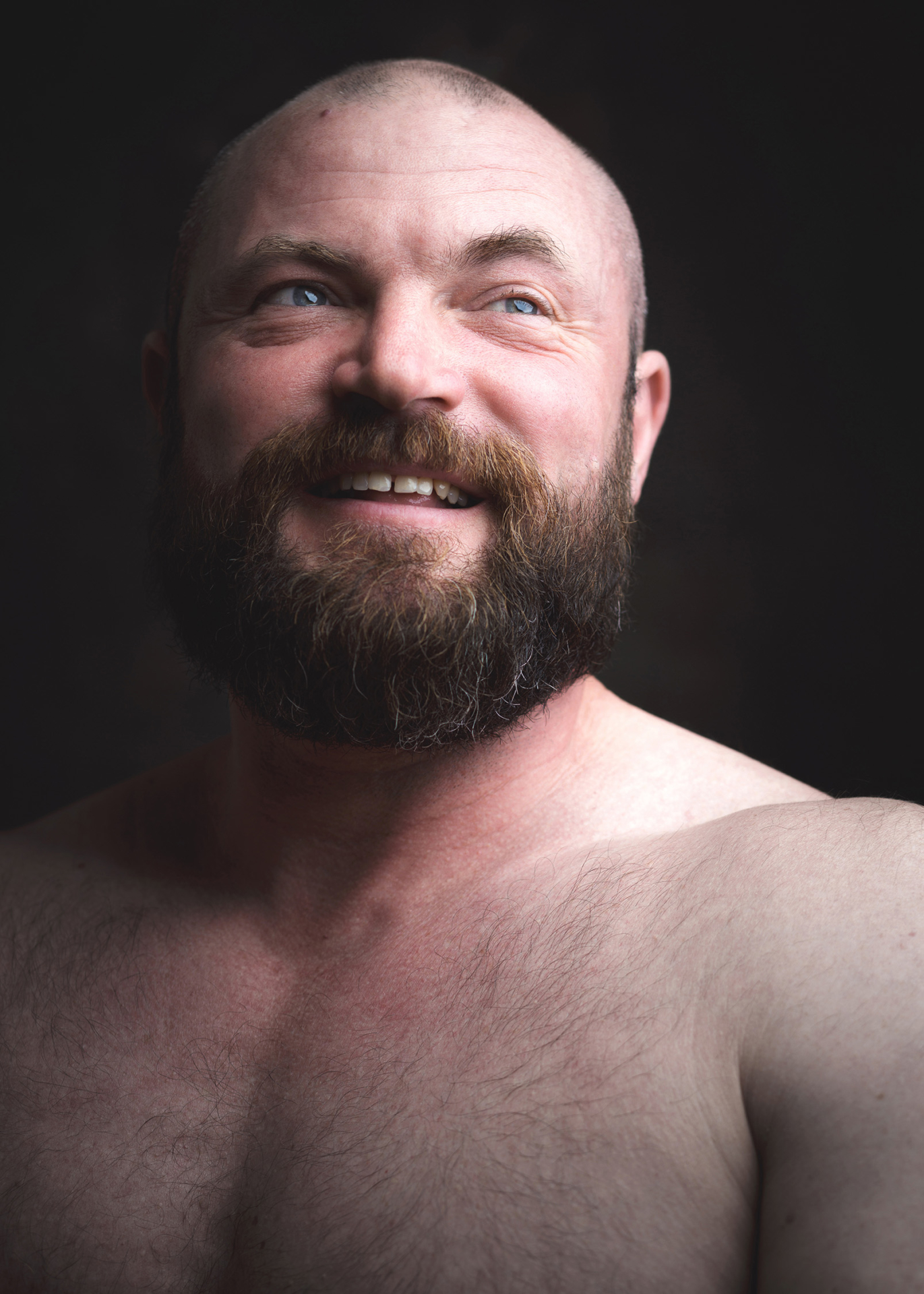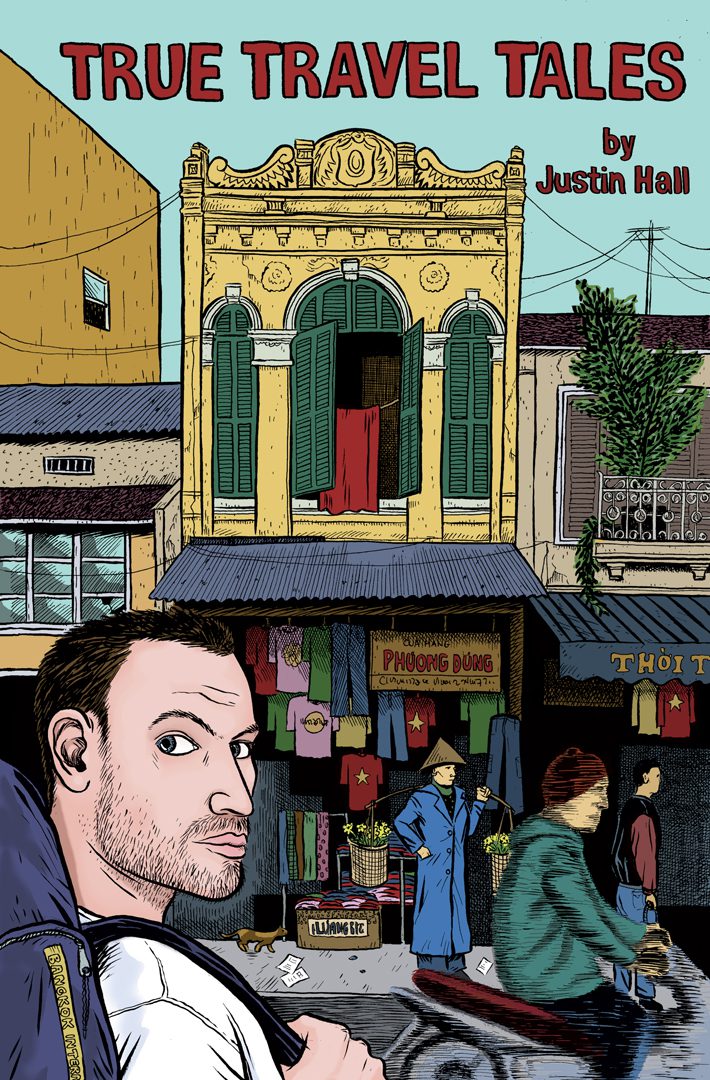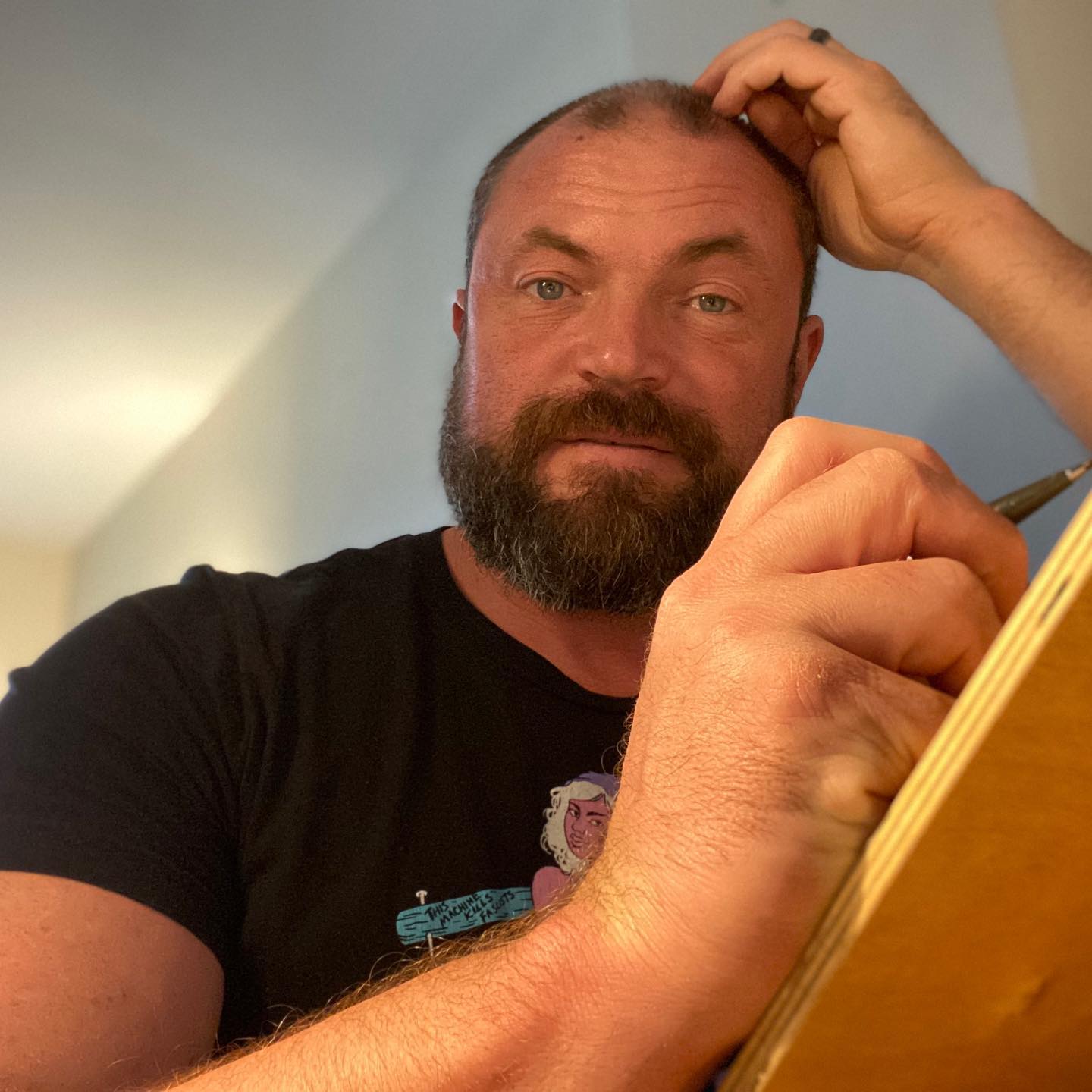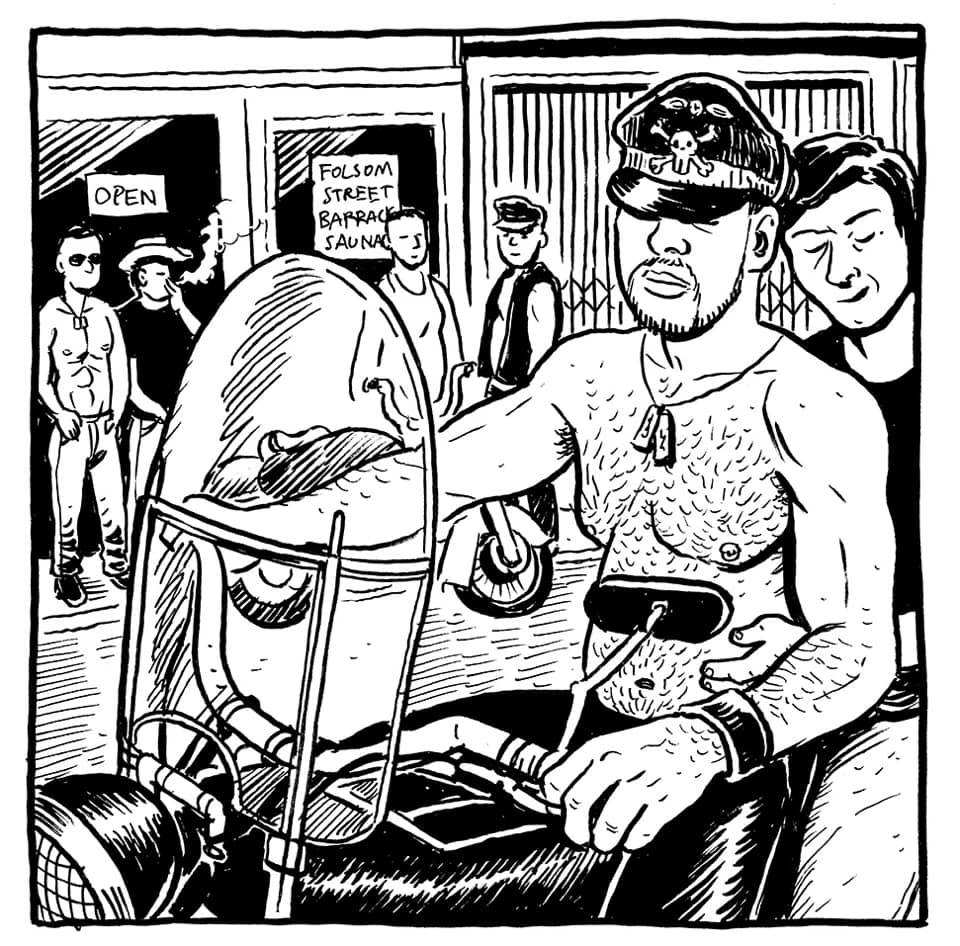
I, admittedly, am not the biggest fan of comic books. I am, however, a huge fan of famed cartoonist and educator Justin Hall, who resides in my 2nd favorite city of the world… San Francisco.
Justin over the years has become a legend in the comic book community. He’s the face behind many cherished works including 2012’s No Straight Lines and Hard to Swallow with fellow cartoonist Dave Davenport. He has truly excelled in autobiographical and gay erotic sections of his world to the point where he’s co-curated acclaimed art exhibits and even organized a biennial conference of international LGBTQ cartoonists, academics, and other professionals called Queers & Comics.

Entertainment, arts and many more industries took a massive nose dive during COVID with the comic book world definitely being one of them. I wanted to check in on Justin to see how things have personally been for him during this time but also to know more about the high’s and lows his industry has dealt with over the past several months.
He chats in depth about that during our exclusive interview with him below. Check it out.
Something that I’ve been trying to cover a lot with Instinct how the people in the arts are affected by COVID. I just did a feature with my friend who works in the world of opera and Broadway here, which they just announced that they’re staying shut down until May of next year, which is just so depressing. You’re obviously very immersed in the LGBTQ part of the art world, but I know there’s more to it than that. So how has COVID affected you guys mostly, since the beginning?
Yeah. I mean, I make comics. The advantage is that they’re not performance art or glass blowing, so we don’t need an in-person audience or lots of resources. We can still continue making material and putting it out into the world. The biggest danger to the comics industry right now is the fact that so many comic bookstores are closed and might very well shut down forever. A lot of these retailers have always hung on by a thread, so a lot of them won’t survive. There’s just no way. And that’s going to be a huge blow to the comics industry.
But comics have been expanding out as a marketplace quite a bit in the last few years. Comic books were really sold only in comic bookstores until fairly recently, but more and more book publishers are publishing graphic novels, which are sold in conventional bookstores. There are also more and more opportunities on the web and through self-publishing and Patreon and things like that. There are ways to get material out there that weren’t available before.
The loss of a lot of the comic book stories will hit companies like Marvel and DC the most. And of course, that will have a cascading effect on the entire industry, which is scary. But increasingly there are other options for cartoonists as well, so that’s what I tell my students.

And how has it affected you personally, outside of all this? After what you just said, for instance, I’m in an industry that thrived in this, with writing, because writing, you can do it wherever. So I think a lot of people, regardless of what kind of writing I was doing, I was doing entertainment, gay, whatever, people wanted to have an excuse from looking at all the COVID news. So has it been like that for you as well, with just getting inspirations while being stuck inside?
Personally, I miss travel. I’m really a compulsive traveler. I spent years on the road with a backpack, been to at least 75 countries, and I would make comics about a lot of my stories from the road. I would even travel with my inks and paper in my backpack and make comics while holed up in some little hut in Laos or Nicaragua or Ghana. And so not having that source of inspiration is pretty frustrating.
And recently I’ve been teaching comics abroad more as well. I teach in the MFA in Comics program at California College of the Arts here in San Francisco, but I’ve also been teaching at a comics school in Denmark fairly regularly, and I did a Fulbright teaching comics in the Czech Republic. And those options are obviously not on the table right now. So that’s frustrating for me personally, because so much of my narrative inspiration and my pedagogical inspiration come from being abroad.
And I also do a lot of erotica, sex stories, and everybody’s sex life has definitely been severely curtailed!
Oh, yeah.
On the one hand, you’re horny at home and you make comics about your fantasies, but I also get really inspired by true life events, and so that takes a beating (so to speak!) as well.
Oh, and I’m also doing a lot of historical comics right now. I’m creating this public art project in San Francisco to commemorate the 50th anniversary of SF Pride this year. It’s a series of comics posters that will go up in the bus stops along Market Street. And it will illustrate six events in San Francisco LGBTQ history leading up to the first Pride, so from 1955 to 1970.
One of these events is the Compton’s Cafeteria Riot, which is when a number of trans women, drag queens, and sex workers rebelled and rioted against the police in San Francisco in 1966, three years before Stonewall. Another is the founding of the Daughters of Bilitis, which was the first lesbian organization, in 1955. There’s also the opening of the Tool Box, which was the first leather bar in San Francisco’s South of Market district. Things like that.
So things like the Compton’s Cafeteria Riot, which is when a number of trans women and drag queens, sex workers rebelled & rioted against the police in San Francisco in 1966 three years before Stonewall. And the founding of the Daughters of Bilitis, which was the first lesbian organization in 1955 as well as he opening of the Tool Box, which was the first leather bar in San Francisco. Things like that.
Normally I would go to San Francisco’s GLBT Historical Society and the SF Public Library and dig through their archives and get photo references and such there, but I can’t do that now. I contacted some archivists, some queer historians that I know, and tracked down a couple of eyewitnesses to the events, so I’ve been able to make it work. But that process has definitely gotten more complicated, since I can’t get at the archives and those materials directly.
Those first two weeks when COVID first hit were also interesting. I was teaching but it was spring break, and everything shut down. And all the other normal stresses on my life were on hold, kind of frozen, because everyone was just going into lockdown. And I mean, it was terrifying, but on the other hand, it also became like an artist residency for me, where suddenly my life was narrowed down to just me at the drawing table and that was it. And there was, I almost hate to say this because I don’t mean to make light of the horror and pain and death that happened, but it was this delicious moment of being focused on my art because I had no other choice.
I had these two weeks of just incredible productivity where I was going back to my graphic novel and banging out pages at a rate that I hadn’t done in a long time, feeling really good about that. But then I also was thinking, it’s weird that I’m… My graphic novel is about all these different things that mean a lot to me, like sex worker rights and San Francisco history and sexual expression and the porn industry, blah, blah, blah. But all of those things suddenly felt… I felt really guilty about writing about those things and not about the pandemic that was in front of me, because everything felt pointless in the face of this monumental tragedy. And I was feeling a little guilty about that.
But recently I looked back at those pages that I had done during that time period, and I have this entire sequence of my protagonist walking to the top of Buena Vista Park. You have these shots from behind him and he’s looking out over the city, which is quite beautiful, but it’s completely desolate. There are no other people in the shot, and this scene goes on and on, just wordless images. And I realized, “Oh, this is about isolation. This is about looking out on a world devoid of people at that moment in the beginning of the pandemic.” And I wouldn’t have drawn these pages that way if it had been another time.
So even if you’re not doing work about the thing that is happening in front of you, that thing creeps into your work anyway, in really interesting ways. And so, I think that the pandemic’s there in all of our work in some way.

I can say the same about mine, because it’s been…. What was it today, I don’t know if you saw this, Atlanta Pride, people had unofficial parties over the weekend, where there was hundreds of people at this one location, and a guy died from it. So I have a piece coming out later tonight basically saying, “Circuit gays, let’s calm down a little bit with this, because I know you don’t want to admit this, but we’re still in this and I don’t know how the guy died, but that doesn’t matter because what you’re doing is you’re putting everyone else’s health at risk. So you can hold off for another couple months with these events. There’s bigger fish to fry.”
We have different varying levels of responsibility and activity. I do find it fascinating how people are reacting differently to this stuff, even within my group of friends. I have friends, and especially artists, who are completely shutting down and closing in. One friend won’t leave his house and really hasn’t in months. And every once in a while, his husband will force him to walk around the block, but mostly he won’t even go onto the deck or really go outside at all. It’s just triggered all of his isolationist and agoraphobic tendencies. I think that’s unhealthy, and he would actually agree with that.
And then on the other hand, I have friends who are basically behaving as if it’s not happening and are going to orgies and having big sex parties and just behaving as if there is no pandemic. That kind of denial is also clearly problematic and unhealthy. But of course, there’s this huge gray area in between so where do you draw your line in the sand? And you have to continually rethink it and reimagine it because the science changes, the circumstances change. We’re all trying to figure out where we’re at with this stuff. It’s complicated.
It’s very complicated. I was talking to my roommate about this the other night, about how when COVID’s over, there may be a renaissance period that we go through, in that because people are so desperate to go back out that we just want to spend our money on things that are going to obviously support hopefully more local organizations than national ones. Do you think that will happen in the comic world?
Yes, I think so. I would imagine that there’ll be a move to try to salvage what we can of the comic book stores, because they are not only places to sell work but they’re also pillars of comics culture. And the really good ones, the ones that are in the Bay Area, for example, they host creators that come through town, they do signings and readings there, they host events in community spaces. They sell zines by local creators who are not published by publishers. They do all of that good community work, and we need them, beyond just selling the latest Spider-Man.
I think that there’s going to be a big push to figure out a way as a community to rally around the stores. That’s already happening, but that will really need to happen as the pandemic starts to wind down and we can get the stores open again and really keep them alive.
Then the comic conventions, the zine fests and comic cons that also are the lifeblood of the comics community, that stuff needs to come back. They’re all going online right now. I ran a panel with Jen Camper about the legacy of the late Howard Cruse for ComicCon, and it was a really interesting thing to put together a virtual panel. People don’t have to gather in real space, so you can do a Zoom panel where you’re getting people from all over the country or all over the world to participate at once.
I’m also seeing this with teaching. We miss the in-person interactions with our students, and our faculty meetings, but there are ways to lean into this. We can get guest speakers to come in from all over without having to fly them in. I think there are things we’re learning from this pandemic that will be useful even after it’s over.
https://www.instagram.com/p/CBOnp7bj9K3/
Yeah, totally. Like, do we actually need an office space? I didn’t think I really needed one. I’m a writer. I can just sit here and do all my stuff.
Yeah, yeah. And education is definitely going to be changing. This summer, I put all my comics history lectures up on VoiceThread, which is a platform for interactive slideshows. And that was really wonderful because students… well, I barrel through these lectures in class, and there’s a tremendous amount of information. And of course, it’s often running through their ears and then out again. But having them recorded, the students were able to digest them at their own pace. They can go back to them. There are a lot of advantages to these digital technologies.
What would you say to our audience, for people that are interested in supporting your world and keeping you guys thriving?
I would say find some of the cartoonists that you really respect and admire, especially the independent ones, and go and support them on Patreon. A lot of them have Patreons. Or go to their website and order some material from them and they can send it to you directly. A lot of them are making cool masks or little zines about COVID, or some fantasy boy-love space-opera webcomic that is total escapism, which we also desperately need right now.
Also, you can support some of the local zine fests and smaller independent comic book conventions. I mean, don’t worry about Comic-Con, it’s going to be fine. The big cons are going to be fine. I’m more worried about the little local zine fests, which are such an inspiration for local creators and up-and-coming creators. So, go online, and they all have these online platforms now, and participate. And if you can, donate. That’d be wonderful.
https://www.instagram.com/p/B-FamJEJOq7/
Anything else you want to add that our viewers should know?
I’m also working as Producer on a documentary film about the pioneers of queer comics, No Straight Lines, which is inspired by my book. And the pandemic has definitely affected that! We intended to have the film done and in the festival circuit this year, but COVID has made it harder to land the final funding for post-production and now the film festivals are all closed down or gone online.
Still, there are new opportunities opening up, with more streaming platforms looking for content and the possibility of online screenings and distribution. It’s a stressful but interesting time to be getting an independent film out into the world. If folks want to help out, they can go to www.nostraightlinesthefilm.com. There’s a trailer there for them to check out as well.
